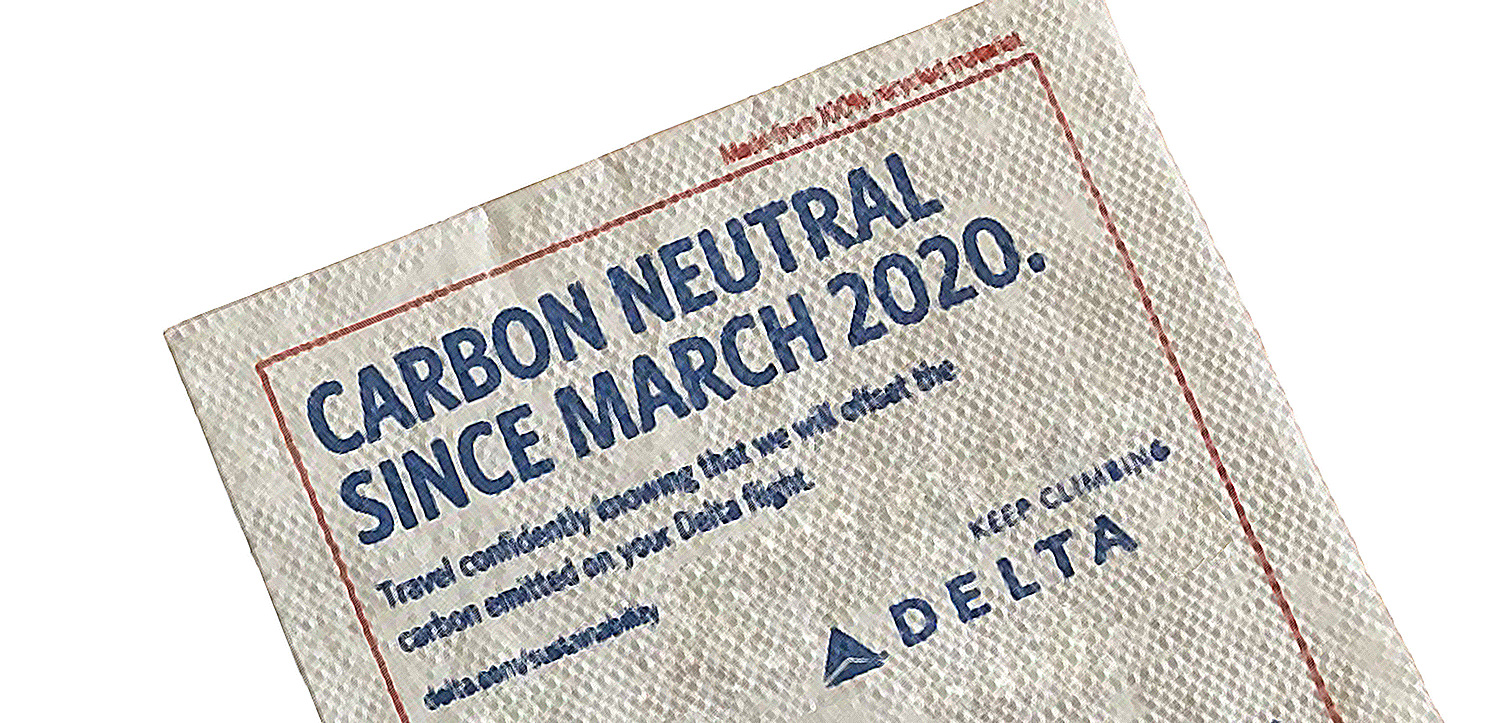
Delta Air Lines proudly proclaims it is “carbon neutral since March 2020,” but that was only possible in 2021 through the dubious purchase of carbon emission offsets. As Delta has discovered, ambitious climate change goals are proving vexing for airlines and sustainability promises may turn into a troubling liability.
Carbon Emission Goals Prove Elusive For Delta Air Lines, Others
Look down at your cocktail napkin next time you fly Delta and you might see:
“Carbon neutral since March 2020.
Travel confidently knowing that we will offset the carbon emitted on your Delta flight.”
But what does that mean? Delta is certainly trying to reach net zero carbon emissions, but when it fell (far) short of the goal in 2021, it spent $137 million to buy carbon offsets for 27 megatons of carbon.
That’s a big deal, right? Well, when you break it down, that is only $5.04 a ton…which is essentially nothing. I don’t mean to downplay the positive impact $137 million will make, but the whole carbon trading business seems so sketch to me…
Delta does have a problem beyond purchasing carbon offsets. In 2020, it boldly promised it would invest $1 billion to reduce its carbon footprint by 2030 (mostly by purchasing more fuel-efficient planes, which of course still emit carbon). But its virtue-signaling ESG (“environment, social and governance”) commitment may well backfire if people hold it accountable. THat could come in the form of shareholder revolts, lawsuits, or even disciplinary action from the Securities and Exchange Commission.
Sam Lissner, a Managing Director at Ridgewood, a private equity firm that invests in U.S. infrastructure and energy, told The Washington Post:
“A lot of it is marketing and virtue signaling. The reality is it’s very challenging to reduce greenhouse gas emissions of particularly a heavy industrial company like an airline or manufacturer without becoming a lot less profitable in the near term.”
And Delta is sensing that. Its new chief sustainability officer, Pam Fletcher, wants to move away from the carbon offset model.
“It was the best tool at the time. So kudos to getting some momentum on climate change. Now we are laser-focused on decarbonization in our company and industry working on the issues within our own four walls.”
To accomplish that goal, Delta plans to:
- electrify ground equipment that transports luggage and pushes planes
- purchase more fuel-efficient planes
- invest in sustainable jet fuels
- collaborate with the Massachusetts Institute of Technology (MIT) to eliminate contrails, which are thought to trap heat and warm the earth
- shift toward carbon capture technology
As always, aspirations are one thing, delivery is quite another…as Delta has already found out.
United Airlines, incidentally, has avoided carbon offsets in favor of carbon capture from the very start of its green overtures. But United will have trouble meeting its ambitious green goals as well.
CONCLUSION
I focus on Delta today, but the problem is not unique to Delta. Other airlines and corporations may find themselves walking back promises as the act of actually reducing carbon footprint proves to be a lot more difficult than promising to do so.
My conviction is that we better get used to the consequences of warmer temperatures because I do not see the will to actually keep global temperatures from rising (and I am not even sure humanity can stop it). That should not stop us from being good stewards of the resources entrusted to us, though.




The lesson here is to stay out of this debate as a public corporation. No advantage making claims like this and Delta won’t gain or lose one customer over it. Getting involved in politics and policy is a no win situation for public companies. Your one job is to make as much money possible for your shareholders, nothing else matters regardless of what a vocal minority screams about.
Delta has traditionally operated a much older fleet than the competition. Perhaps if they were serious they could phase out older jets in favor of new ones?
I’d also love to see a reduction in plastic and packaging waste. An easy place to start would be the sky clubs that have disposable everything.
the question is….what is the environmental impact of all the mining to produce the batteries? What is the environmental cost to dispose of the spent batteries? It’s a bit like nuclear power generation, aside from the safety issue, the spent fuel rods last “forever”, and there is an environmental cost for that that do not show up in the calculation of the cost per kwh.
Clearly we have to do ‘something’ but we should make sure we are not making it right in one sector and wrong in another sector.